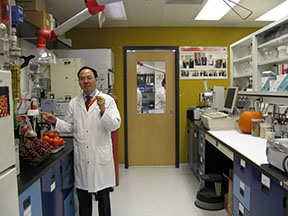Set up an interview
Media Relations
Agriculture and Agri-Food Canada
1-866-345-7972
aafc.mediarelations-relationsmedias.aac@agr.gc.ca
Canola oil, considered one of the world’s three most common vegetable oils (along with soybean and palm oil), contains high levels of naturally occurring Vitamin E. This vitamin, apart from its antioxidant properties, can play an important role in maintaining healthy vision and organ function, including blood, brain, and skin. However, the content of natural Vitamin E found in canola seeds is degraded during traditional oil extraction and refining processes that currently use high temperatures and organic solvents to produce canola oil. This prompted research scientists from Agriculture and Agri-Food Canada (AAFC) to team up with scientists at the University of Manitoba to find a way to extract more natural Vitamin E from canola seeds grown in Canada, creating even greater value for one of Canada’s most widely produced crops.
The researchers at AAFC’s Guelph Research and Development Centre, Drs. John Shi, Qingrui Sun and Sophia Xue, with Dr. Martin Scanlon from University of Manitoba, and Dr. Zhen-xiang (John) Lu from the Lethbridge Research and Development Centre, are considered international experts in food processing technology. They have significant experience in refining and using a supercritical fluid extraction process to separate specific nutrients and antioxidants from raw material – including the by-products of fruits, vegetables and seeds. This environmentally friendly process uses only mixed water and carbon dioxide as solvents to extract natural Vitamin E, without any chemical residues in final products. Operating under low temperature and low pressure, this process helps stabilize the nutrient and minimize oxidative damage that can occur once exposed to oxygen. This ensures high quality and superior health benefits of the final product.
"Green processing technologies can protect the health-promoting property of those natural components under low temperatures and pressure. The final products are safe and high quality, without any chemical residue. My research lab focuses on developing green process technologies that perform separation and extraction to develop health-promoting food ingredients for functional foods."
- Dr. John Shi, Research Scientist, Agriculture and Agri-Food Canada
In order to extract natural, intact concentrated Vitamin E from the seeds, the team optimized the density of supercritical fluid of mixed carbon dioxide and water as a key parameter to enhance the selectivity of extracting natural Vitamin E from canola seeds, which resulted in an innovative, high-selectivity process. This process and technology extracts more than 90 percent of the Vitamin E from canola seeds, and oil extracted in this way had more than 10 times higher concentration of Vitamin E than in oil produced through traditional extracting and refining processes. This value-added end product now shows promise for use in the manufacture of nutritional supplements and pharmaceutical ingredients. Increased Vitamin E content also demonstrates the potential for canola oil to be marketed as a health-promoting functional food.
“It is the priority of AAFC’s research program to develop high-value products from agricultural byproducts to support the Canadian food industry,” says Dr. Shi. “For example, we have extracted lycopene from tomato skin, grape seed oil from grape pomace, essential oil from peach stone, and beta-carotene from pumpkin, in addition to other applications with enhanced marketing value.”
Grown on almost 23 million acres in Canada, canola production and processing are an important mainstay in the Canadian economy. However, even more value can be added to the crop as an abundant and rich source of raw material to produce Vitamin E and other health-promoting compounds. The process to extract Vitamin E-rich oil from canola seeds has already attracted interest from the food processing industry in Manitoba and Saskatchewan. That’s good news for canola growers and Canada’s vegetable oil industry. The team’s first and consecutive research papers are published in LWT - Food Science and Technology (2021) journal.
The Intellectual Property disclosure for this technology was registered under Canola AgriScience Research Cluster Program in 2019 by the University of Manitoba.
Key discoveries/benefits
- This is important news for Canada’s canola producers, as the crop’s natural Vitamin E content holds great potential for applications in medical and health products – and can be used to develop high-value end products.
- This green processing technology can be used to extract nutrients from a variety of raw natural materials.
- Extracted nutrients are kept as stable as possible through low temperatures and pressure, which means they retain their nutritional and/or health benefits longer.
- Natural Vitamin E from agro-material has more health-promoting benefits than Vitamin E obtained synthetically and derived from petrochemicals, or obtained through extraction processes involving chemicals.
Photo gallery

Dr. John Shi, Research Scientist at AAFC’s Guelph Research and Development Centre

Canola, also called (a.k.a.) “Canada’s golden crop”, is known for its vibrant yellow flowers

Canola seeds

The supercritical fluid extractor used to extract Vitamin E from canola seeds